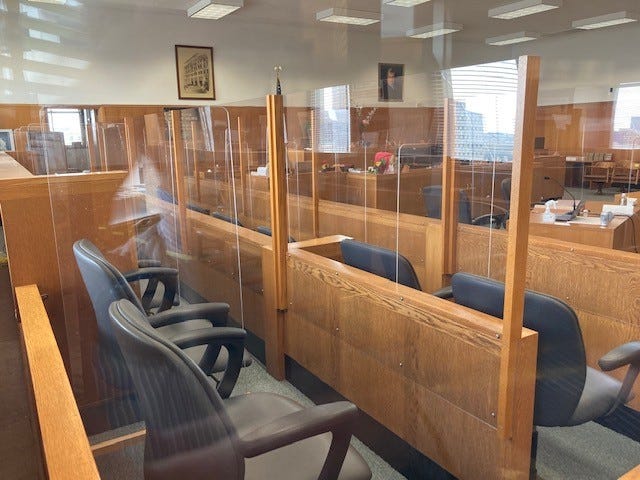How To Get Out Of Jury Duty During Covid
Courts throughout America are allowing prospective jurors worried about COVID-19 risks to delay their jury duty or get out of it entirely.
Granted on a case-by-case basis, states are letting people postpone their service for up to a full year. With COVID-19 hospitalizations on the rise again, it's brought relief to immunocompromised jurors, families struggling with employment and childcare challenges, and folks not yet ready for face-to-face interactions and public gatherings, according to jury commissioners such as Massachusetts' Pam Wood.
"When people call us and say, 'I'm worried about COVID or my spouse is vulnerable,' we say, 'Why don't we just postpone you?'" said Wood. "You have that absolute right."
Statutes already allow you to postpone jury duty
States are granting the requests using statutes that predate the pandemic and give people the right to postpone their jury duty for "any reason or no reason," Wood said.
That level of discretion has long been available to judges and jury administrators, according to Rhode Island Assistant Court Administrator Craig Berke and New Hampshire Superior Court Chief Justice Tina Nadeau.
In Plymouth, Massachusetts:Distancing and occupancy restrictions eased as Plymouth courts return to pre-COVID norm
"That existed before COVID," said Berke. "The jury commissioner's office would take concerns on a case-by-case basis. That's how they've always done it."
Some, such as Massachusetts and Rhode Island, have gone a step further to create and post specific guidelines governing juror dismissals due to the COVID-19 pandemic. Permanent disqualifications from jury duty were rare prior to the pandemic and continue to be today, but court staff throughout New England said there are applicable exemptions for medical conditions and other reasons.

How is juror turnout so far in New England?
Courts throughout the country are experiencing COVID-related juror shortages that are complicating their ability to work through the substantial case and trial backlogs that have piled up due to the pandemic.
Those backlogs are making it difficult for many people to find housing, jobs and other necessities as their cases linger indefinitely, and prosecutors and defense attorneys alike have said their caseloads have ballooned to untenable levels in the process.
Postponed trials and closed courthouses:Court backlogs harm people awaiting trial; fuel community solutions as courts reopen
Wood said Massachusetts, home to New England's busiest courts, is "looking really good" in terms of juror turnout. That's despite the commonwealth's website — like most states' websites — making it easy to postpone jury service or ask to be disqualified.
Before the courts started resuming trials, Wood said she worried pandemic postponements would make it significantly harder to find enough jurors. However, even when COVID-19 cases were at their highest levels locally and nationally in 2020, Wood said Massachusetts' courts still saw between 40% and 60% of their typical turnout for any given jury selection day.

"We were able to adjust for that and just send more summonses (to jurors)," said Wood. "Now, as we prepare (for trials in September) … we've been tracking pretty carefully how many people have confirmed for the summonses that we've sent out and we've been quite favorably impressed with the numbers."
Berke said Rhode Island, which has a significantly smaller case volume, is also in good shape. The state has only summoned jurors for two trials during the pandemic, but he said they've summoned far more jurors than needed to get a sufficient pool. He said they'll continue to do so.
Happening in Ohio:Marion County courts struggling with low juror turnout amid the pandemic
Berke said he believes courthouse infrastructure changes — upgraded air systems, reconfigured buildings and stringent safety protocols due to COVID, for example — have played a big role in easing coronavirus hesitancy among his state's prospective jurors. During jury selection in a case last October, court staff used the opportunity to poll the 70 people in the pool about the changes; 53 people said they were somewhat or very comfortable with them.

Court staff hope that confidence will continue as courts work through their trial backlogs. The courts don't encourage jurors to postpone their service or seek disqualifications, but Wood said they'll work with people if public confidence turns and more people wish to opt out.
"Somebody said (last week), 'Well, I don't think it's going to change. I don't feel like postponing for a year is going to change the situation,'" she said. "I hope he's wrong. I hope we're in a much better health situation in a year than we are now, but if somebody says, 'I want to get out of this, I want to be disqualified and I don't want to appear at all,' then we'll talk with them about whether there is a statutory disqualification that might apply to them."
How To Get Out Of Jury Duty During Covid
Source: https://www.providencejournal.com/story/news/2021/09/01/jury-duty-excused-covid-19-pandemic-new-england-massachusetts-rhode-island-guidelines/5649180001/
Posted by: patelsamses.blogspot.com

0 Response to "How To Get Out Of Jury Duty During Covid"
Post a Comment